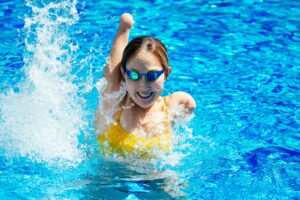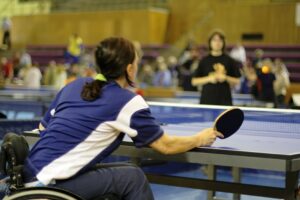The upcoming Tokyo Paralympics will be an opportunity to inspire the next generation of Canadian Paralympians. However, without strong development pathways, young Canadians may not have the opportunity to pursue their dreams. An important first step along any development pathway is a positive introduction to sport through grassroots community programs. There is a persisting gap in the literature related to athletes’ experiences of existing community parasport programs, particularly among youth participants. As part of my Master’s research project, I spoke with female youth participants in a community multi-sport parasport program in Ontario to hear about their experiences. The athletes shared the ways they felt their participation had impacted their personal development, as well as their views of the program and how it fit into their lives.
Personal development
Athletes discussed four benefits to their personal development from their participation in the program:

- Social development – Athletes felt that the program gave them more opportunities to socialize with new peers and supportive adults, which led to a bigger social circle and increased their level of comfort when socializing with new people.
- Physical development – Athletes felt they developed sport specific skills and improved their general strength and fitness.
- Self-perceptions – Athletes discussed feeling more confident in their abilities. One participant’s mother described how her daughter became less self-conscious about her impairment through her participation in the parasport program.
“Before she went to the parasport program she wasn’t playing any sports at school. She was [self-conscious about it], and after being in the parasport program she did great and enjoyed it and it wasn’t any issue. After that she was happy to try things [at school].”
- Athlete development – After taking part in the program, athletes had a desire to continue with parasport, and goals for future sport and physical activity participation.
My sport future is playing hockey [or] wheelchair basketball. And I’m gonna be a professional.
The Program

Athletes also reflected on the aspects of the program that either enhanced or lessened their parasport experience. These reflections align with some of the “9 Ps of a Para-Ready Program” identified in the Becoming Para Ready resource (for more information see the SIRC blog about becoming para ready).
- Para-specificity – The para-specific design of the program created an opportunity for inclusion, regardless of sport experience or skill level. This design supported athletes’ need for belonging in ways they had not experienced before. However, some athletes felt unchallenged by the activities. These findings highlight that while the congregated setting can be beneficial, it may be important to group participants based on sport experience and skill. Both belongingness and challenge are included as key elements of quality parasport participation within Evans et al.’s (2018) framework.
When I’m in the parasport environment I feel really, really good. It’s nice because you’re there with people who, uh, with challenges just like you
- New Engagement – Athletes discussed how this multi-sport parasport program was different from the other sport opportunities that were available. The program introduced them to new sports and activities, made them comfortable by adopting a less intense attitude about competition than other activities they have done, and allowed them to achieve greater levels of success than they had experienced before. These sentiments highlight the value of congregated programming, and should be used in communication and promotional strategies to attract new participants.
- Coaches Matter – Coaches are an important source of encouragement and motivation, but also knowledge. Athletes described positive and supportive relationships with their coaches. However, they indicated not all coaches were well versed in parasport skills, negatively impacting their ability to effectively coach the athletes. Finding people to coach community programs is not always easy, especially for voluntary positions. The athletes’ comments reinforce the importance of coach education on parasport skills and strategy. The Coaching Association of Canada’s Coaching Athletes with a Disability e-learning module includes information about designing positive, safe and inclusive sport experiences for persons with a disability.
You don’t want the coach to be confused about what they’re doing.
- Blocked Pathway – Though the program inspired these female youth to continue with sport, opportunities were limited. Critical gaps exist in the development pathways from introductory parasport programs to lifelong participation or elite competition. A lack of programming limits valuable opportunities for social interaction, realization of health benefits, and outcomes associated with skill development, mastery, and the pursuit of goals.
Summary
The experiences of these athletes highlight the importance of community programming for supporting positive youth development and fostering a love of sport. It is important that programs are well-prepared to support athletes, with trained coaches and meaningful, appropriate activities. The athletes in community parasport programs want to learn and master skills, and deserve the opportunity to work towards their goals. It is our hope that with the high-quality resources developed in recent years, organizations will continue to develop their capacity to support all athletes, and the availability and accessibility of sport will cease to be prominent barriers among persons with disabilities.